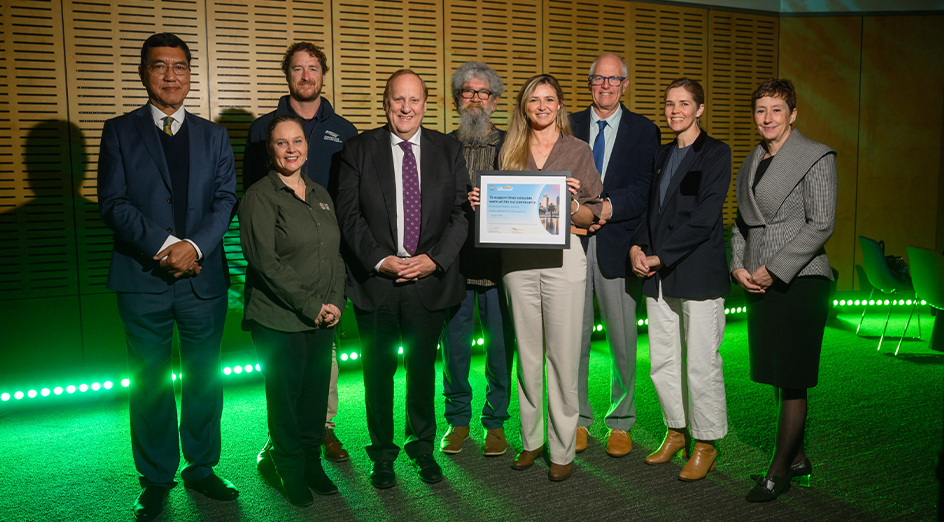
Lotterywest Boosts SW Peatland Research Efforts
Scientists studying Western Australia’s endangered South West peatland ecosystems have received a $3.38 million boost from Lotterywest that will support a major collaboration to better understand and manage the peatlands.
The ancient and organic-rich wetlands, derived from Western Australian plants such as Empodisma, Reedia and Warren River cedar, are highly sensitive to disturbance, climate change and altered land use. They store significant carbon, regulate water flow, and support unique biodiversity – yet remain under-recognised and under-studied.
The PEAT Southwest project builds upon an existing project known as PEAT – Protecting Peatland Ecosystems and Addressing Threats in Southwestern Australia – through expanding work to include peatland systems across the State’s South West and Great Southern regions.
Image: Professor Amit Chakma, UWA Vice-Chancellor; Mr Alexander Hams, NRM South Coast; Ms Linda Metz, NRM South West; The Honourable Don Punch MLA, Minister for Aboriginal Affairs, Water, Climate Resilience, South West; Dr Wayne Webb, Wadandi-Pibulmun Noongar Elder; Ms Holly Winkle, PEAT Project; Emeritus Professor Pierre Horwitz, ECU; Professor Nicki Mitchell, PEAT Project; Professor Claire Pollock, Vice-Chancellor, ECU.
Co-led by The University of Western Australia and Edith Cowan University, and guided by Noongar Elders, the broader project will be delivered in partnership with South Coast NRM, South West NRM, the Walpole Nornalup National Parks Association, the Department of Biodiversity, Conservation and Attractions, the Western Australian Museum and Biologic Environmental.
Project leader UWA Professor Nicki Mitchell said peatlands were precious natural capital for Western Australia, as well as catalogues of past environments.
“Lotterywest’s support means we can literally and figuratively put our peatlands on the global map. It will also enable us to comprehensively study some of our oldest and most distinctive species, such as sunset frogs, pitcher plants and a range of invertebrates, which have evolved in and around peatlands.”
Co-leader Dr Dave Blake from ECU said peatland ecosystems were under increasing threat from climate change, particularly in temperate regions such as southwestern Australia, where changing hydrological and fire regimes threaten their existence.
“The Lotterywest support has enabled us to assemble a formidable collaboration, including Traditional Owners, academia, State Government and community groups, to undertake a transdisciplinary approach to the conservation of these complex systems and the species they support.”
Dr Manda Page, CEO South West NRM, said her organisation was seeking to drive positive environmental outcomes beyond the local to a landscape scale, across all four million hectares of the region.
“The depth and breadth of this formal collaboration creates a unique opportunity for the rapid transfer of scientific knowledge to on-ground action at a large scale,” Dr Page said.
“NRMs have a long history of providing meaningful linkages between science and practice and between the environment and communities so we are both proud and privileged to assist in this ground-breaking project to benefit Southwestern peatlands.”
Tom Nagle, Program Lead – Priority Landscapes, South Coast NRM, said the grant would enable his organisation to support conservation efforts from the Ramsar Wetlands of the Esperance area in the east to the Walpole wilderness area in the west.
“We welcome the opportunity to work alongside such a diverse consortium of First Nations, research and practitioner partners,” Mr Nagle said.
The Lotterywest grant complements existing financial support from The Ian Potter Foundation, the two universities and other contributors. Empodisma peatlands across southwestern Australia were nationally listed as a Threatened Ecological Community in 2023 due to their loss and degradation associated with our drying climate, damaging fire regimes and feral pigs.
Since 2023, the PEAT team has been delivering ecological, hydrological, geological and cultural research on peatlands, aided by citizen science, within the Walpole Wilderness Area.
With support from Lotterywest, this work will now scale up across the broader region – including regional peatland mapping, condition assessments, co-designed monitoring tools, targeted on-ground activities, and training opportunities for Aboriginal Rangers.
The project also supports partnerships with local groups and government agencies to build long-term capacity in peatland management and aims to position these ecosystems more clearly within regional, national and global conservation priorities.
https://www.uwa.edu.au/news/article/2025/july/lotterywest-grant-to-expand-sw-peatland-research-collaboration


